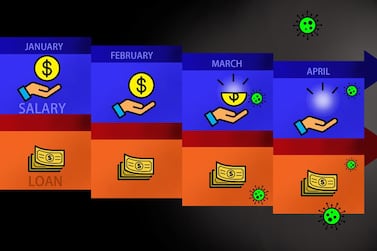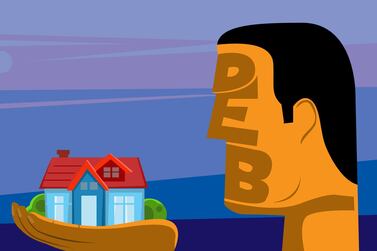For the past few years I have been living hand to mouth as I try to repay my debts. I have an outstanding car loan balance of Dh5,226, which I have been unable to clear and I cannot cater to my basic monthly needs.
My debts are:
Car loan: Dh5,226
Credit card: Dh5,000
Court fees: Dh800 (related to the unpaid loan)
Total debt: Dh11,026
I took on the car loan in April 2014 when I bought a 2008 Nissan Xtrail. I was making the payments on time but stopped in 2018 because I was also paying off a personal loan that deducted Dh3,700 from my account.
I no longer use the car, which has been parked up since August last year, as I have an expired licence and the vehicle has a warrant of arrest on it due to the unpaid loan. This means I cannot renew my licence or drive the car on the road.
I finally cleared the personal loan, which I took on for a business that did not work out, in August last year. However, I still could not settle the car loan.
I earn Dh7,500 working in the facility management industry and I struggle to pay my bills and provide for my family both here and back home in Kenya. I'm struggling to meet my daily expenses and have also built up a credit card debt. While my husband’s salary covers the rent and a few expenses, he cannot help me with my debts. Plus we have an 18-month-old toddler to support.
Some of my debt was run up in the birth as I had an emergency Caesarean, which was not covered by insurance. We borrowed money from friends, which we later repaid, so you can imagine that when all of this happened my plan to repay the car loan went to zero.
The car loan expired in April 2018, so the bank wanted the whole amount repaid instead of agreeing to settle on monthly repayments of Dh500, which I could have cleared by now. The missed payments have now affected my credit rating so I have not been unable to take on more credit to clear the debt. When I last checked my rating with Al Etihad Credit Bureau, my credit score was 300.
My monthly expenses come to about Dh4,000 and include Dh1,500 for a domestic helper, Dh1,500 for transport, Dh315 for Wi-Fi, Dh210 for my phone and between Dh500 to Dh700 for utility bills.
I am 41, from Kenya, and this issue has been troubling me for some time, especially when the bank's agents call me to follow up. Most of the time it leaves me feeling depressed. How can I get a loan to resolve this? MG, Sharjah
Debt panellist 1: Philip King, head of retail banking at Abu Dhabi Islamic Bank
Accumulated debt can carry a heavy emotional toll, especially when you are financially responsible for your household and have a young child. Understandably, this must be a very difficult time; however, you have taken the correct steps by confronting your liabilities. Ideally, you should have considered paying off your card debt before your loan, as the former typically costs more in fees and charges.
During these globally challenging times, contact your bank to understand if there are means available to help ease your financial burden. It is in the bank’s interest to recover your overdue debt and they may now be open to a restructuring. Take the initiative as it shows the bank you are committed to addressing your situation. In terms of rebuilding your credit score, you need to maintain control in reducing your outstanding card balance while ensuring that all future repayments are made on time. This will be helped if you repay more than the minimum amount due.
In addition to the above, look to reduce your monthly expenses as far as possible by trimming down on unnecessary spending. At the same time, it is vital you consolidate any savings you may have in order to keep up with your household expenses.
With a salary of Dh7,500 and expenses of Dh4,000 you already have a healthy surplus which should enable you to clear your debt within four to six months, as long as you remain disciplined. If you continue to feel under pressure, evaluate whether it is worth selling your car, which you are unable to use in any case. As an immediate next step, you should pay your court fees as soon as possible. The ramifications for delaying this further may be severe.
Debt panellist 2: Ambareen Musa, founder and chief executive of Souqalmal.com
Your outstanding loan is smaller than your monthly salary, which puts you in a far better position to repay it than many others struggling with overwhelming debts. It's really just a matter of tightening your belt for two to three months, and before you know it, you'll be debt-free for good.
Review your expenses and look for ways to cut back wherever you can. For instance, the Dh1,500 you were spending on transport should have gone down over the last two months with the lockdown placing restrictions on movement. Even after deducting regular monthly expenses, you are able to save Dh3,500 or nearly 46 per cent of your salary. These savings alone can help you wipe out your car loan within two months and the court fees too.
Since your outstanding car loan has now reached an official default status with legal proceedings being initiated against you, you must focus all of your energy and resources towards getting rid of it. Your credit card debt will need your attention next, but for the next two to three months only make the minimum payment every month. This will help you avoid late payment penalties, while giving you some time and wiggle room to gather the funds needed to close the car loan. Once that's been taken care of, you can refocus and prioritise your credit card repayment, since it's a high-interest debt that will only multiply the longer you leave it unpaid.
As for your credit score, 300 is indeed the lowest score possible, indicating that you're facing serious debt repayment problems. However, once you clear your outstanding car loan and credit card debt, your credit score will automatically start improving.
To boost your credit score in the future, keep your credit utilisation rate low – i.e. use up a smaller portion of the authorised credit limit on your credit card, preferably under 30 per cent. Also, keep making repayments on schedule. Your credit score will then rise slowly and with it your credit worthiness.
Debt panellist 3: Rasheda Khatun Khan, founder of Design Your Life
Simply deciding to stop making repayments to a loan will always cause a sticky situation. Instead, the moment you anticipate there might be a problem, you must contact your loan provider. A bank has a legal contract with you whereby you make a promise to repay money you borrowed. Failure to meet your contractual commitment means the bank has the right to take the necessary action. It’s important to understand this before you commit to a loan of any sort so you can also plan in case of emergency.
Emergencies crop up all the time, they are simply part of life. Having no emergency fund in place puts you at financial risk. Also, allowing your driving licence to expire without taking any action adds to the issues you are facing. It is important to analyse your spending pattern and behaviour first so you can prevent the same patterns creating a similar situation in the future.
An option for you right now is to approach the courts for help. Under the UAE's insolvency law, the courts can arrange a repayment plan with your bank. Before you apply to the courts make sure you know your numbers. Review your expenses and cut back on anything you can. Look at what you can afford towards repaying your debts and have that figure in mind when you apply to the courts.
Also ask for help from your family and community. Can they support you financially in any way right now? Do you have any assets you can sell to help you reduce your debts? Is your company in a position to help you? Explore all options and remain focused on finding solutions.
The Debt Panel is a weekly column to help readers tackle their debts more effectively. If you have a question for the panel, write to pf@thenational.ae










